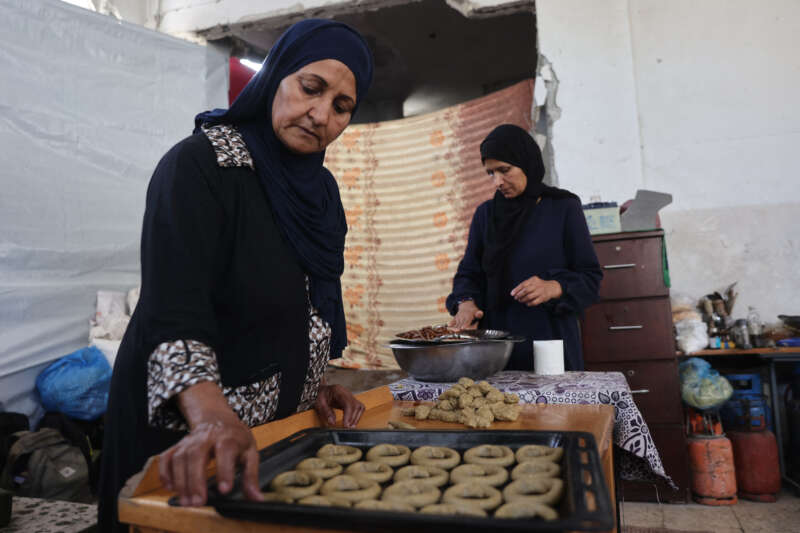What Ramadan has been like this year in Gaza
A family breaks their fast in Gaza City, Gaza on March 10, 2025.
Anas Baba/NPR
Eid al-fitr, which marks the end of Ramadan, was once eagerly awaited in Gaza, a rare occasion that brought a sense of joy and normalcy. Its preparations began days in advance — homes were cleaned, a fresh touch of decoration was added and families made sure everything was in place for the celebration. Parents saved up to buy new clothes for their children, knowing how much it meant to them to dress well on Eid.
The streets stayed lively late into the night, filled with people shopping for last-minute essentials. Bakeries worked tirelessly, filling the air with the scent of ka’ak, the traditional date-stuffed cookies, alongside trays of chocolate and vanilla biscuits — simple treats that would soon be shared over coffee with guests. Shops displayed an array of high-quality chocolates, candies, halkom (Turkish delight) and roasted nuts, small luxuries that made Eid feel complete.
On the first morning of Eid, we would wake up early, dress in our best clothes and make our way to the mosque for the Eid prayer. There, we exchanged greetings, smiles and handshakes, a heartfelt tradition that carried deep meaning, reminding us that Eid is about togetherness. The takbirat, the chants of “Allahu Akbar” recited on Eid, filled the air, creating a familiar rhythm that made the day feel different, wrapped in a quiet sense of spiritual peace.
After the Eid prayer, we would head home to prepare breakfast. Breakfast was always special, made exclusively for Eid al-Fitr. It included fesikh — a fermented, salted and dried fish with a bold, briny flavor — along with salad dressed in tahini sauce and tomatoes fried in olive oil.
People in Gaza eagerly awaited Eid al-Fitr, especially for this breakfast, rich with diverse flavors. What made this breakfast even more special was the gathering of families around the table, where we would laugh, share stories and savor every bite together.
For the first week of Ramadan, Palestinians gathered together in Gaza to mark the holy month of Ramadan with a respite from war, during a ceasefire between Israel and Hamas.
Anas Baba/NPR
It is 2 a.m. and three young men walk through the rubble of a neighborhood destroyed by Israeli airstrikes, beating a drum and singing Muslim chants.
They're loud, and that's the point. They are waking people up, reminding them to eat before another day of fasting begins at dawn, during the holy month of Ramadan.
This year, those observing Ramadan in Gaza are also following the sounds of Israeli airstrikes, warplanes and drones.
In the second week of Ramadan, in early March, Israel broke a brief ceasefire and resumed war in Gaza. The Israeli government said it was to pressure Hamas to release Israeli hostages.
Recent Israeli airstrikes have killed nearly 1,000 people, including hundreds of children, according to Gaza health officials. Palestinians have evacuated their neighborhoods by order of the Israeli military.
Hope that the war might end has been shattered, as Ramadan comes to a close this weekend.
"This is psychological warfare," says Issam Zakkout, who does not know whether to flee his home or stay.
Food supplies are scarce because of an Israeli blockade
This Ramadan, people in Gaza are struggling to find food.
Israel allowed humanitarian aid to flow into Gaza during the brief ceasefire in January and February. But for the past month, it has imposed a blockade on Gaza, barring the entry of all aid, even food.
Israel says it's to pressure Hamas. Rights groups say it's collective punishment to civilians.
Aid groups are now rationing supplies. The United Nations is pulling some of its staff out of Gaza.
At one community kitchen, hungry and tired people wait in a long line for a meal of beans to break their Ramadan fast.
Before the war, Fouad Nassar would break his fast with chicken, fish and kebabs.
"Every day we had proper meals. We didn't need anyone's help. Now, why am I standing two hours in line for a plate from the charity kitchen?" Nassar said.
A meal is prepared amongst the ruins of Gaza City, Gaza on March 9, 2025.
Anas Baba/NPR
Making pizza inside a gutted microwave
Atop piles of concrete debris of her destroyed apartment building, Rana al-Abadi cooks for iftar, the meal that breaks the fast during Ramadan.
Before the war, Palestinian dishes of spiced chicken, rice and vegetables were served every night of Ramadan. Now she makes pizza with canned mushrooms, canned corn, canned sauce and canned cheese.
She removed a microwave's insides, and turned it into an oven, lighting a fire using foam from bed mattresses her husband collected from under rubble around their neighborhood.
Burnt foam sticks to the dough of the pizza her children will eat. She has no other choice.
"Before, Ramadan was full of variety, colors and flavors. Now, we barely have anything," she says.
One week of celebration was dashed by the return to war
At the beginning of the holy month, some families gathered outdoors for free Ramadan meals, organized by an Egyptian charity.
Now, daily Israeli airstrikes make it too dangerous to gather that way. In war, there is nothing to celebrate.
But for just one week this Ramadan, families were able to gather, after months of displacement, at long tables, among mounds of smashed concrete and strings of battery-powered lights.
Palestinian children walk through the rubble of Gaza City, Gaza on March 6, 2025.
Anas Baba/NPR
Families that had lost so much in the war could enjoy relaxed quality time together, like a family reunion, eating a Ramadan meal without war.
Gaza mothers bring joy to children ahead of Eid al-Fitr despite war
Inside a shelter in Khan Younis, southern Gaza, Palestinian women are preparing Kaak, traditional Eid cookies, in hopes of lifting their children’s spirits, despite the ongoing Israeli military offensive that resumed on March 18, 2025.
Amid deep grief, destruction, and the loss of homes and loved ones, the women are working to provide their children with even the smallest moments of joy, trying to shield them from the hardship caused by Israel’s continued closure of border crossings.
Palestinian women displaced from northern Gaza make traditional cookies for the upcoming Eid al-Fitr holiday in Gaza City, on March 28, 2025.
This year, Eid al-Fitr, a festival of breaking the fast at the end of the holy month of Ramadan, arrives in Gaza under severe humanitarian and economic strain, as Israeli attacks intensify.
Eid al-Fitr is the first of the two main festivals in Islam, the other being Eid al-Adha.
Since March 2, 2025, Israel has enforced a full blockade on the Gaza Strip by shutting all crossings and preventing the entry of humanitarian, medical, and relief aid.
Markets are nearly empty, and the cost of remaining goods has surged, making it nearly impossible for Palestinians, impoverished by the war, to meet basic needs.
Last week, the Gaza Government Media Office said the territory has entered the first phase of famine due to the continued blockade and the obstruction of life-saving aid.
Determination to live
In a display of resilience, Kawthar Hussein sits beside an earthen oven in the corner of the shelter, trying to ignite a fire to bake Eid cookies while Israeli artillery shells nearby areas of the Gaza Strip.
With no access to cooking gas because of the blockade, the women are using cardboard and wood to cook, a process that is both time-consuming and exhausting.
Ignoring the smoke, Hussein carefully places cookies on trays to begin baking.
She said: "The atmosphere here is very sad. We have lost many relatives and loved ones, and we are suffering from a major humanitarian crisis."
“We are a people who love life. We don't want our children to live in deprivation. We try to provide them with everything we can, even if it's little,” she told Anadolu.
Before the war, she would prepare about 9 kilograms (19.8 pounds) of cookies during Eid. This year, she is making only one kilogram (2.2 pounds), hoping to bring some comfort to children affected by the war.
Although grief surrounds them, she believes celebrating Eid remains one of "God’s rituals that should be revived."
Joy amid war
Umm Mohammed, another Palestinian woman, is also trying to give her children and grandchildren a sense of Eid by making cookies for them.
She told Anadolu: "We managed to make a little bit of cookies to compensate the children for what they have lost from the Eid rituals during the genocide."
“Sadness surrounds the children. We try to make them happy by giving them one cookie each, and that is all we can provide,” she added.
On March 18, the Israeli army launched a surprise aerial attack on Gaza, killing 896 people and injuring nearly 2,000, effectively ending the ceasefire and prisoner exchange agreement.
Since October 2023, Israeli attacks have killed more than 50,200 Palestinians — mostly women and children — and injured over 114,000, according to health authorities.
The International Criminal Court issued arrest warrants in November for Israeli Prime Minister Benjamin Netanyahu and former Defense Minister Yoav Gallant for war crimes and crimes against humanity in Gaza.
Israel is also facing a genocide case at the International Court of Justice over its war on the enclave.
















